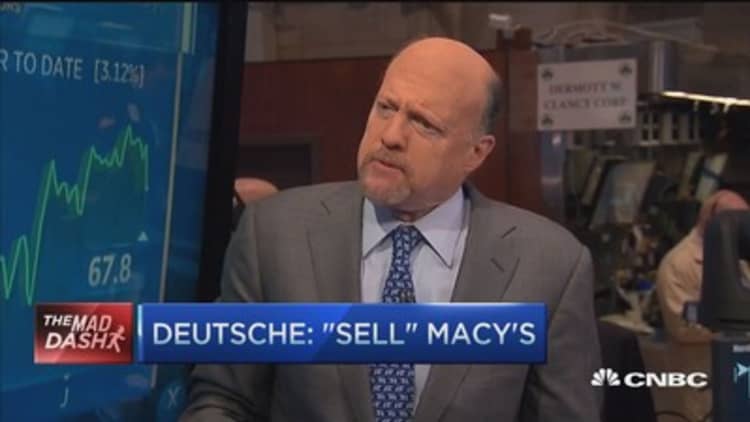As department stores continue to bleed market share, one analyst is losing hope that one of the sector's former top performers will be able to outmaneuver shifting consumer trends and other external headwinds.
Deutsche Bank analyst Paul Trussell on Monday downgraded Macy's from "buy" to "sell," citing "low confidence that the company can bust out of its same-stores sales rut." He listed lagging revenue from tourists; sales declines at one of its key vendors, Michael Kors; and the ongoing promotional environment as contributing factors.
The company's shares were down more nearly 3 percent in midday trading Monday, to $67.91.
"We are concerned as Macy's quarterly two-year same-store sales trend has dipped into negative territory for the first time in the past 15 years outside the two periods associated with the recessions," Trussell wrote in a note to investors.
Read MoreCramer: Macy's downgrade is 'shocking'
"While activewear remains a bright spot ... demand for the categories of items that Macy's sells has generally waned."
Among those items, Trussell wrote, is women's apparel. Sales in that category have dropped nearly 18 percent since 2007, according to data from the Bureau of Labor Statistics.
Other headwinds facing Macy's are sluggish sales from foreign tourists—which account for about 5 percent of the company's annual sales—in light of the strengthening dollar.
Read MoreMacy's falls short; what's behind its rollercoaster results?
And slowing trends at Michael Kors—which Trussell estimates contributed as much as 1.2 percent to Macy's sales comparisons from 2012 to 2014. Over the next two years, he said, it could drop to a 0.4 percent contribution.
"We are especially concerned as we see no obvious juggernaut to replace the lost dollars, and we note ongoing challenges at other key vendors as well," Trussell said, citing Coach, Guess, Ralph Lauren and Tommy Hilfiger parent PVH.

The department store space has been a tough place to be for the past decade, as supercenters, off-price and outlet stores, along with the convenience of online shopping, have eroded its market share. According to a recent report by IBISWorld, revenue in this sector is expected to decline 4.4 percent in 2015.
That's on top of a 5 percent drop in 2014, and a 6 percent decline in 2013. Revenue growth has been negative for department stores since 2002, when it was flat, according to IBISWorld's data.
Read MoreMacy's joins bargain game in new bid for growth
Craig Johnson, president of Customer Growth Partners, said department stores' market share has dropped to just 1.9 percent—down from 5 percent in 2000, and 12 percent in the 1980s.
"Of the 30-year time span, the biggest share gainers over the first two decades were Wal-Mart and Target; and over the most recent 10 years, the biggest share gainers by sector were warehouse/clubs (notably Costco), the off-pricers (TJX [and] Ross) and the dollar stores," Johnson said in an email.
Macy's has been actively looking for ways to jump-start its growth. In February, the company said it would acquire Bluemercury, a beauty retailer, for $210 million. It is also testing stores in the off-price market, with plans for six locations in the metropolitan New York City area.
And earlier this month, Macy's signed an agreement with Men's Wearhouse to operate shop-in-shops in 300 of its stores, as it tries to capture a greater portion of the wedding market.
"We see weddings and special occasions as strategic growth opportunities for Macy's," its chief merchandising officer, Tim Baxter, said at the time.
Speculation has also been swirling that Macy's will follow in the footsteps of Sears and Hudson's Bay by utilizing a real estate investment trust. Macy's owned about half of its 800-plus stores at the end of January, with Trussell estimating the company's real estate value at $11 billion.
Though Trussell admits such a move could "drive significant value" for the company's shares, he said in his view, a deal is unlikely. He added that the stock's valuation "already bakes in the real estate value."
Trussell has a $63 price target on the retailer, down from $71.


